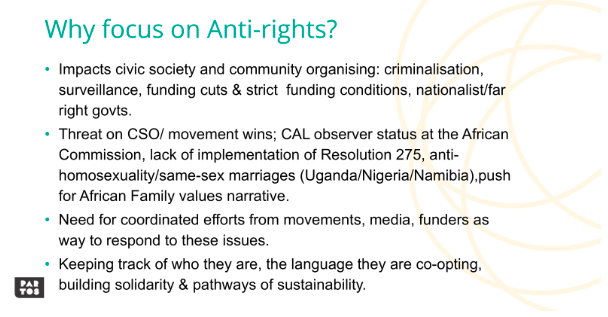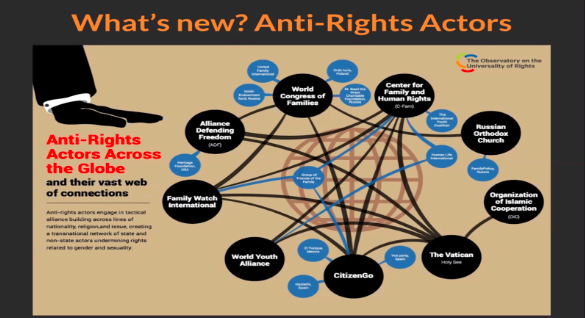
Understanding the Anti-Rights Movement
The anti-rights movement is a global network rooted in far-right ideologies, often tied to religious and conservative values. These movements systematically target marginalised communities, including LGBTIQ+ people, Black and Indigenous communities and women. We see the anti-rights movement growing over the last years, with more outspoken and direct attacks on civic rights and freedoms and on democracies. The anti-rights movement affects all of us. It impacts civil society and community organising by proposing and implementing laws that ‘undermine sexual and reproductive health and rights (SRHR), gender rights and criminalise LGBTIQ+ persons, by applying strict funding conditions or not cutting funding, and by using language that provokes discrimination and violence.
“This is not just an LGBTIQ+ issue, it’s a bigger movement against bodily autonomy, reproductive rights, racial justice and civil liberties. Whether it’s abortion rights, sex workers’ rights or the right to exist as queer and trans people, these battles are interconnected.”
Botho Maruantona, Mama Cash

Who Are the Key Players and what kind of tactics do they use?
Anti-rights actors engage in tactical alliance building across lines of nationality, religion and topics such as family values and abortion. By doing so, they create transnational networks of state and non-state actors undermining rights related to gender and sexuality. Catholic and conservative organisations and foundations, orthodox groups, and other religious groups across Africa and Europe push an agenda of restrictive policies under the guise of “parental rights” and “family values” while opposing LGBTQ+ rights and comprehensive sexuality education.
Operating with significant financial backing, anti-rights groups use co-opted human rights language to appeal to broader audiences. Working with groups including First Ladies, professional associations, religious groups and NGOs in countries across the globe, anti-rights groups lobby and influence politics and religious institutions to roll back progressive policies. The groups continue to grow and win ground by using tactics such as misinformation & intimidation including aggressive litigation to drain resources of civil society organisations and by lobbying at institutions like the United Nations, the European Parliament, and the African Union.

How can civil society respond to the anti-rights movements?
One of the ways for civil society to respond is to keep track of what these organisations stand for as they present differently to appeal to different audiences, including their links to far-right political organisations. As mentioned by Kerry Cullinan: “We should expose them [anti-rights groups] all the time, particularly their sources of funding…. These organisations are playing the long-game”. Anti-Rights movements have been strategizing for decades (the Heritage Foundation was formed in 1973); progressive movements must do the same by planning ahead, forming networks, and continuously advocating.
We need to keep ourselves in the spaces where the anti-rights movement is present, leverage regional legal frameworks, such as Resolution 275 at the African Commission and challenge and redefine terms like “family values” and “African values” based on inclusivity, justice, and historical accuracy. The non-threatening way to approach is to say “what is a kind and loving family”. The anti-rights groups claim to have a blueprint for a “natural family” based on a nuclear heterosexual family where a man is the head of the family and his wife and children are under his control. We can counter their narrative by showing that a kind family accepting and nurtures all its members. By engaging young children, who have a natural understanding of fairness, we can show them what it means to be fair and kind.
We see active attacks on the media and freedom of speech. These are avenues we need to keep close to ourselves. An example is that there are hundreds of anti-rights podcasts, but hardly any progressive ones, whilst this is where we can reach young men to counter misinformation. There is a need to invest in alternative platforms other than X and Facebook to bypass censorship and in digital security.
“If we go back to our own systems of how communities build themselves, by revisiting traditional systems of community building, mutual aid, and alternative funding models—drawing on methods such as stokvels (community savings groups) or village banking, we can support activism outside of capitalist funding structures.”
Botho Maruantona, Mama Cash
Donors and funders can play a role in strengthening fundraising and ensuring that resources are going to the movements. Having resources that meet the immediate need, and trusting that movements know what is needed builds cross-movement solidarity, uniting LGBTQ+ rights, feminist, racial justice and other human rights efforts.
From grassroots movements to global advocacy, every effort counts in pushing back against anti-rights narratives.
“There have always been waves of oppression, but also waves of resistance and progress. We need to keep the fire in our hearts.”
Kerry Cullinan, journalist.
Leave No One Behind Brown Bag Sessions
This Brown Bag lunch session is part of a series organised by the Partos Leave No One Behind Community of Practice (LNOB) with inspiring presentations on intersectionality and Leave No One Behind in practice. Digest fresh off the shelve, or yet to be tested best practices, tools, and approaches that aim to put rightsholders in the driving seat and reduce discrimination. Do you have ideas for collaboration or organizing another brownbag session? Contact gigi@partos.nl